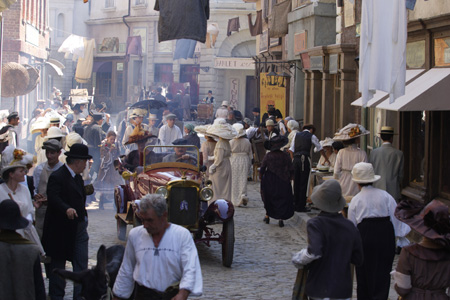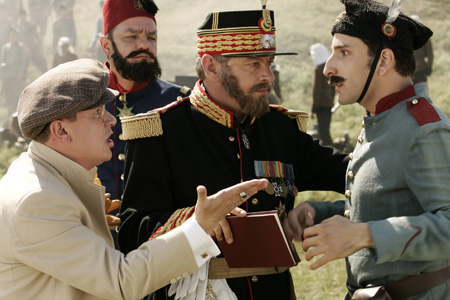
We are in 1911. We have hardly passed over the first moment of panic, created by that terrible steam engine which seemed to crush everybody. There are magicians around: they catch pictures and make them move on the walls. 'The 7th Art' is still to be invented. But the audience is already there, in the dark...
19 year old Grig is the son of one of the stars of the National Theatre. His own achievements are, however, somehow disappointing... Too short to be on stage, too shy with women, too excessive in his lifestyle, the son is about to make the greatest mistake of all by committing himself to the very activity considered a sin by his father - Grig will direct a movie! And not any movie, but the greatest - and longest - of them all, which will be the accurate retelling of the war against the Turks in which Romania gained its independence.

A romantic 'dramedy', mixing truth an fiction, about the making of Romania's first feature film (The War of Independence, Grigore Brezianu, 1912) and about the passion and madness required by film-making. A hilarious period-piece of widescreen entertainment and a mesmerizing score by French composer Laurent Couson.
“... an intelligent crowd-pleaser made with affection for its characters and era” (Variety)

Awards
Official selection, Locarno International Film Festival 2007
Nae Caranfil
Eastern European cinemas have always obsessed a bit about 'generations'... So, here comes Nae Caranfil, who makes a generation all by himself. Caranfil emerged as a film-maker in Romania of the 1980s and, as life and film-making didn't seem much fun at the time, he decided to spend some time in France, right at the moment when communism started collapsing in his native country. In the wake of the political changes of the 1990s, Caranfil returned home and, after several years, even managed to shoot his debut feature. E Pericoloso Sporgersi / Don't Lean Out of the Window, a story about communist Romania as a restrictive 'home' and about one woman's longing to 'lean out' towards a promising elsewhere, was shown in the Director's Fortnight in Cannes 1993 and is now an important chapter of domestic film history. One decade and several films later, when the New Romanian Cinema emerged in the 2000s, Caranfil was cast as the quintessential 'transitional' film-maker, who provided a connection between the politically controlled and aesthetically bankrupt cinema of the 1980s, and the fresh, gripping and (said) minimalist works of the likes of Puiu, Porumboiu, Mungiu.
But if Romania itself has never been happy with its labelling as a 'transitional' country, why would Caranfil be content as Romania's 'transitional film-maker'? Too young to be a 'precursor' (of New Romanian Cinema) and too gifted to be just a 'link' between generations which are actually worlds apart (the 1980s vs. the 2000s), Caranfil can inspire an auteurist nostalgia - he writes, directs and composes music - but remains the Romanian film-maker who knows best how to please his audiences.






